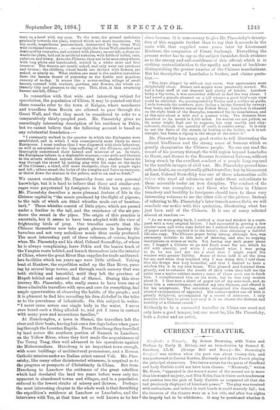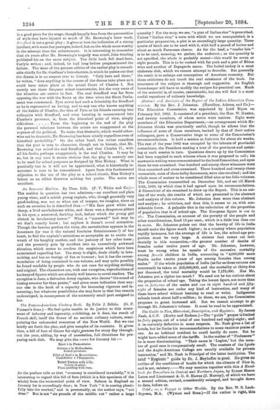CURRENT LITERATURE.
stroffora: a Trafiedy. By Robert Browning, with Notes and Preface by Emily H. Hickey, and an Introduction by Samuel It Gardiner, LL.D. (George Bell and Sons.)—Mr. Browning's Strafford was written when the poet was about twenty-five, and was performed at Covent Garden, Macready and Helen Faucit playing the principal characters. Two better actors for the parts of Strafford and Lady Carlisle could not have been chosen. " Macready," writes Mr. Gosse, "appeared in the second scene of the second act in more than his wonted majesty, and Miss Helen Faucit threw such tenderness and passion into the part of Lady Carlisle as surpassed all that she had previously displayed of histrionic power." The play was received with enthusiasm, and indeed in such hands it could scarcely fail; but the finances of the theatre were at a low ebb, and after five nights the tragedy had to be withdrawn. It may be questioned whether it
is a good piece for the stage, though happily free from the perversities of style that have injured so much of Mr. Browning's later work. Strafford is not a great play ; it gives at best the indication of a strong intellect, with some fine passages, indeed, but on the whole more worthy in the attempt than the achievement. It is interesting to remember that six years after Mr. Browning's tragedy was acted, John Sterling published his on the same subject. The little book fell dead-born, Carlyle writes ; and, indeed, he had long before prognosticated the failure. The issue of the present edition of the earlier play is remark- able chiefly for Dr. Gardiner's Introduction, in which he points out that the drama is in no respect true to history. "Only here and there," he writes, "does anything in the course of the drama take place as it could have taken place at the actual Court of Charles I. Not merely are there frequent minor inaccuracies, but the very roots of the situation are untrue to fact. The real Strafford was far from opposing the war with the Scots at the time when the Short Parlia- ment was summoned. Pym never had such a friendship for Strafford as he is represented as having, and to any one who knows anything of the habits of Charles, the idea of Pym or his friends entering into colloquies with Strafford, and even bursting in unannounced into Charles's presence, is, from the historical point of view, simply ridiculous From the beginning to the end of the play the personal relations between the actors are exaggerated at the expense of the political. To make that dramatic, which would other- wise not be dramatic, Mr. Browning has been utterly regardless even of historical probability." On the other hand, the writer considers that the poet is true to character, though not to history, that Mr. Browning has seized the real Strafford, and that Charles II., with all his faults, perhaps exaggerated, is the real Charles. It may be SO, but in any case it seems obvious that the play is scarcely one to be used for school purposes as designed by Miss Hickey. What is poetically fine in it will not be appreciated, what is historically in- accurate is sure to be remembered. Apart from this fundamental objection to the use of the play as a school classic, Miss Hickey's labour as an editor deserves nothing but praise. The notes are excellent.



































 Previous page
Previous page